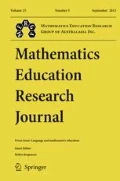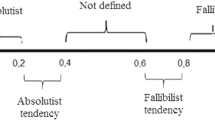Abstract
The study compared beliefs about mathematics teaching of four pre-service elementary teachers involved in an intervention experience with those of their non-involved peers. During this intervention, which was based on a socio-constructivist approach to mathematics instruction, the intervention group participated in regular, small-group teaching experiences supported by on-going seminars. The study also examined the relationship between professed beliefs and observed actions for the intervention group.
Although most pre-service teachers in this study seemed to attach some importance to children building their own knowledge through social interaction, the intervention group professed significantly stronger beliefs in a socio-constructivist instructional environment than the comparison group. Even though the intervention group strongly espoused socio-constructivist beliefs, they were not uniformly successful in translating these beliefs into instructional actions. Their actions appeared to be most consistent with a socio-constructivist perspective during the initial phase of an instructional episode, but in later phases their actions reflected more traditional beliefs about teaching mathematics.
Similar content being viewed by others
References
Ball, D. L. (1988). Unlearning to teach mathematics.For the Learning of Mathematics, 8(1), 40–48.
Ball, D. L. (1990). Breaking with experience in learning to teach mathematics: The role of a pre-service methods course.For the Learning of Mathematics, 10(2), 10–16.
Bednarz, N., & Janvier, B. (1988). A constructivist approach to numeration in primary school: Results of a three year intervention with the same group of children.Educational Studies in Mathematics, 19, 299–331.
Civil, M. (1990). “You only do math in math”: A look at four prospective teacher’s views about mathematics.For the Learning of Mathematics, 10(1), 7–9.
Cobb, P., Wood, T., & Yackel, E. (1990). Classrooms as learning environments for teachers and researchers. In R.B. Davis (Ed.),Constructivist views on the teaching and learning of mathematics (pp.125–146). Reston, VA: National Council of Teachers of Mathematics.
Cobb, P., Wood, T., & Yackel, E. (1991). A constructivist approach to second grade mathematics. In E. von Glasersfeld (Ed.),Radical constructivism in mathematics education (pp.157–176). Dordrecht: Reidel.
Cobb, P., Wood, T., Yackel, E., Nicholls, J., Wheatley, G., Trigatti, B., & Perlwitz, M. (1991). Assessment of a problem-centered second-grade mathematics project.Journal for Research in Mathematics Education, 22(1), 3–29.
Eisenhart, M. A. (1988). The ethnographic research tradition and mathematics education research.Journal for Research in Mathematics Education, 19(2), 99–114.
Ernest, P. (1989). The impact of beliefs on the teaching of mathematics. In P. Ernest (Ed.),Mathematics teaching: The state of the art (pp.249–253). New York: Falmer.
Farris, P. J., Henniger, M., & Bischoff, J. A. (1991). After the wave of reform, the role of early clinical experiences in elementary teacher education.Action in Teacher Education, 13(2), 20–24.
Jones, G. A., & Thornton, C. A. (1993). Vygotsky revisited: Nurturing young children’s understanding of number.Focus on Learning Problems in Mathematics, 25(2&3), 18–28.
Jones, G. A., Thornton, C.A., & Van Zoest, L. R. (1992).First Grade Children’s Understanding of Multi-Digit Numbers. Paper presented at the annual meeting of the American Educational Research Association, San Francisco.
Jones, G. A., Thornton, C. A., & Putt, I. J. (in press). A model for nurturing and assessing multidigit number sense among first grade children.Educational Studies in Mathematics.
Kesler, R., Jr. (1985).Teachers’ instructional behavior related to their conceptions of teaching and mathematics and their level of dogmatism: Four case studies. Unpublished doctoral dissertation, University of Georgia, Athens.
Kirk, R.E. (1982).Experimental design: Procedures for the behavioral sciences (2nd ed.). Pacific Grove, CA: Brooks/Cole Pub. Co.
Kuhs, T. M., & Ball, D. L. (1986).Approaches to teaching mathematics: Mapping the domains of knowledge, skills, and disposition (Research Memo). Lansing, MI: Michigan State University, Center on Teacher Education
Leder, G. C. (1985). Measurement of attitude to mathematics.For the Learning of Mathematics, 5(3), 18–34.
Leitzel, J. R. C. (1991).A call for change: Recommendations for the mathematical preparation of teachers of mathematics. Washington, D.C.: Mathematical Association of America.
Mandler, G. (1989). Affect and learning: Causes and consequences of emotional interactions. In D. B. McLeod & V. M. Adams (Eds.),Affect and mathematical problem solving: A new perspective (pp. 3–19). New York: Springer-Verlag.
McDiarmid, G. W. (1990). Challenging prospective teachers’ beliefs during early field experience: A quixotic undertaking?Journal of Teacher Education, 41(3), 12–20.
McLeod, D. B. (1989). The role of affect in mathematical problem solving. In D.B. McLeod & V.M. Adams (Eds.),Affect and mathematical problem solving: A new perspective (pp. 20–35). New York: Springer-Verlag.
Miles, M. B., & Huberman, A.M. (1984).Qualitative data analysis: A sourcebook of new methods. Beverly Hills: Sage.
National Council of Teachers of Mathematics. (1989).Curriculum and Evaluation Standards for School Mathematics. Reston, VA: Author.
National Council of Teachers of Mathematics. (1991).Professional Standards for Teaching Mathematics. Reston, VA: Author.
National Research Council. (1989).Everybody counts: A report to the nation on the future of mathematics education. Washington, D.C.: National Academy Press.
Parmelee, J. (1992).Instructional patterns of student teachers of middle school mathematics: An ethnographic study. Unpublished doctoral dissertation, Illinois State University.
Piaget, J. (1970).Genetic epistimology. New York: Columbia University Press.
Richards, J. (1991). Mathematical discussions. In E. von Glasersfeld (Ed.),Radical constructivism tit mathematics education (pp. 13–51). Dordrecht: Reidel.
Ross, S. M., Hughes, T. M., & Hill, R. E. (1981). Field experiences a meaningful contexts for learning about learning.Journal of Educational Research, 75(2), 103–107.
Scherer, C. (1979). Effects of early field experience on student teachers’ self-concepts and performance.Journal of Educational Research, 47, 208–214.
Steffe, L. P., Cobb, P., & von Glasersfeld, E. (1988).Construction of arithmetical meanings and strategies. New York: Springer-Verlag.
Steffe, L. P., von Glasersfeld, E., Richards, J., &, Cobb, P. (1983).Children’s counting types: Philosophy, theory, and application. New York: Praeger Scientific.
Strawitz, B. M., & Malone, M. R. (1986). The influence of field experiences on stages of concern and attitudes of pre-service teachers toward science and science teaching.Journal of Research in Science Teaching, 23(4), 311–320.
Sunal, D. W. (1980). Effects of field experience during elementary methods course on pre-service teacher behavior.Journal of Research in Science Teaching, 17, 17–23.
Thompson, A. G. (1992). Teachers’ beliefs and conceptions: A synthesis of the research. In D. A. Grouws (Ed.),Handbook of research on mathematics education (pp. 127–146). Reston, VA: National Council of Teachers of mathematics.
Thornton, C. A., & Bohn, A. P. (1992).I can number the ways: Place value activities for early primary grades. Lincolnshire, IL: Learning Resources.
Thornton, C. A., Jones, G. A., & Hill, K. (1993).More ways to number. Lincolnshire, IL: Learning Resources.
Vygotsky, L. (1978).Mind in society: The development of higher psychological processes. Cambridge, MA: Harvard University Press.
Wood, T., Cobb, P., & Yackel, E. (1991). Change in teaching mathematics: A case study.American Educational Research Journal, 28(3), 587–616.
Wood, T., & Yackel, E. (1990). The development of collaborative dialogue within small group interactions. In L.P. Steffe & T. Wood (Eds.),Transforming children’s mathematics education. International perspectives (pp.244–252). Hillsdale, NJ: Lawrence Erlbaum Associates.
Yackel, E., Cobb, P., & Wood, T. (1991). Small-group interactions as a source of learning opportunities in second-grade mathematics.Journal for Research in Mathematics Education, 22(5), 390–408.
Yackel, E., Cobb, P., Wood, T., Wheatley, G., & Merkel, G. (1990). The importance of social interactions in children’s construction of mathematical knowledge. In T. Cooney (Ed.),1990 Yearbook of the National Council of Teachers of Mathematics (pp.12–21). Reston, VA: National Council of Teachers of Mathematics.
Author information
Authors and Affiliations
Rights and permissions
About this article
Cite this article
Van Zoest, L.R., Jones, G.A. & Thornton, C.A. Beliefs about mathematics teaching held by pre-service teachers involved in a first grade mentorship program. Math Ed Res J 6, 37–55 (1994). https://doi.org/10.1007/BF03217261
Issue Date:
DOI: https://doi.org/10.1007/BF03217261




